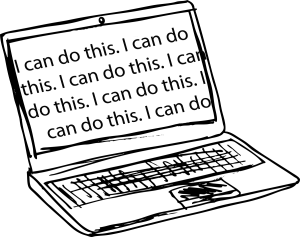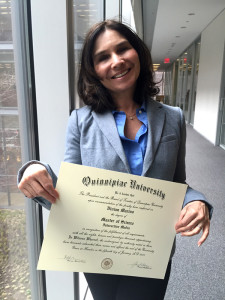I haven’t had too many opportunities – free time, really – to visit my college alma mater, Rider University, since graduating with a Bachelor of Arts degree in journalism over 30 years ago. (Work, kids, house, divorce, single motherhood, and later, grad school … You get the picture.) I returned only once in 1992 to receive a Distinguished Alumna Award from the communications department, and another time a couple of years later as a guest lecturer for a journalism class.
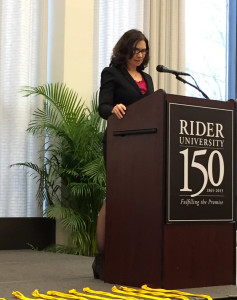 I made a long-overdue, third appearance last week – about two decades after the previous visit, yikes! – this time to receive another award from the communications department: the Lambda Pi Eta Alumni Achievement Award. And I had the honor of addressing the students being inducted into the Lambda Pi Eta national honor society for communications studies, along with their proud parents, professors and university administration. The event was especially important because it marked the 150th anniversary of the university’s founding, and it included a special tribute to the man who founded the school’s communications and journalism department, Dr. Howard Schwartz, who died last summer.
I made a long-overdue, third appearance last week – about two decades after the previous visit, yikes! – this time to receive another award from the communications department: the Lambda Pi Eta Alumni Achievement Award. And I had the honor of addressing the students being inducted into the Lambda Pi Eta national honor society for communications studies, along with their proud parents, professors and university administration. The event was especially important because it marked the 150th anniversary of the university’s founding, and it included a special tribute to the man who founded the school’s communications and journalism department, Dr. Howard Schwartz, who died last summer.
It was Dr. Schwartz, actually, who helped me start a career in journalism. I came to Rider as a transfer student, and he spent a great deal of time choreographing my schedule, ensuring that I took the right courses and graduated on time. He encouraged me to get involved in activities outside the classroom. And so I wrote for the Rider News; I became the faculty editor for the yearbook; and I joined Sigma Delta Chi, the society of professional journalists. (Lambda Pi Eta wasn’t around back then.) I also took his advice about getting internships – I found them to be not only good résumé builders, but also a way to test whether I even wanted to continue in my career path as a journalist. Obviously I did.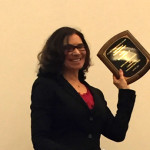
I enrolled at Rider long before all of the current students I was addressing were even born, and when the news industry was in the midst of a major transition – computers. Gone were the noisy old typewriters, a staple in the once-smoky newsrooms, and in were these boxy electronic behemoths that took up an entire desk. The Internet was invented back then, though not widely available. So reporters had to get their information the old-fashion way: by calling people up on the phone or wading through reams of files themselves.
Competition for jobs was beyond fierce when I started college – thanks to a little scandal in Washington known as Watergate. It seemed everyone wanted to be the next Woodward and Bernstein, including me. I still remember being warned by my professors that even if everyone, all at once, had left their newspaper, magazine and broadcast jobs, there still wouldn’t be enough openings for the current crop of journalism students.
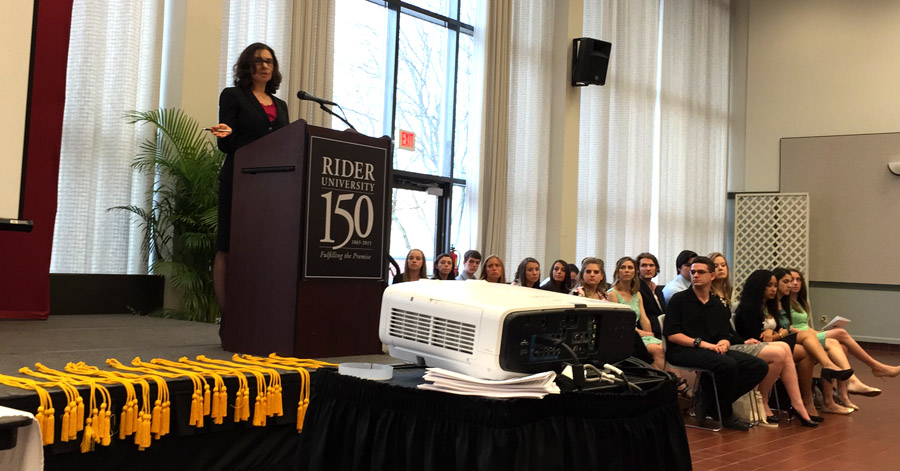 Today’s students (along with the rest of us in the business) must also deal with an industry in great transition. And probably one that is just as fiercely competitive, only in different ways. In this digital world, there are so many more platforms for communicating a story. In fact, there are probably ways that have yet to be invented. The main advice I could give these youngsters (I can call them that, because they’re basically as old as my daughters) was to do everything they can to stay current and to never, ever, ever stop learning. Already they have a leg up on the old-timers in the business. They are being offered crucial classes in digital marketing, web design, video editing and coding – I had to go to grad school to learn those skills!
Today’s students (along with the rest of us in the business) must also deal with an industry in great transition. And probably one that is just as fiercely competitive, only in different ways. In this digital world, there are so many more platforms for communicating a story. In fact, there are probably ways that have yet to be invented. The main advice I could give these youngsters (I can call them that, because they’re basically as old as my daughters) was to do everything they can to stay current and to never, ever, ever stop learning. Already they have a leg up on the old-timers in the business. They are being offered crucial classes in digital marketing, web design, video editing and coding – I had to go to grad school to learn those skills!
But perhaps the most crucial advice I could impart to this next generation of journalists, broadcasters, film producers and marketers was to remind them to never lose sight of what’s always remained constant and most important in the communications business, and that is, telling the story in the most engaging, honest – and accurate way.
I can still hear the annoying mantra one of my journalism professors never tired of saying years ago: “Accuracy, accuracy, accuracy!” he would shout during class and pound his fist down on the desk for special effect.
Some things will never change.
